- Home
- Neal Asher
Lockdown Tales
Lockdown Tales Read online
Lockdown Tales
Neal Asher
NewCon Press
England
First edition, published in the UK December 2020
by NewCon Press
41 Wheatsheaf Road, Alconbury Weston, Cambs, PE28 4LF, UK
NCP249 (hardback)
NCP250 (softback)
10 9 8 7 6 5 4 3 2 1
This collection copyright © 2020 by Ian Whates
All stories copyright © 2020 by Neal Asher
Introduction and story notes copyright © 2020 by Neal Asher
Covert art copyright © 2020 by Vincent Sammy
“Monitor Logan” first appeared in significantly different form in the anthology World War Four (Zombie Pirate Publishing) in 2019. The version featured here appears in print for the first time.
All other stories are wholly original to this collection, copyright © 2020.
All rights reserved.
ISBN: 978-1-912950-74-4 (hardback)
978-1-912950-75-1 (softback)
Cover Art and front cover titles by Vincent Sammy
Editing and text layout by Ian Whates
LOCKDOWN TALES
An Introduction
Seven years ago as I write this I was feeling very pleased with myself. I’d got well ahead of my Macmillan publishing schedule of one book a year and written an entire trilogy to first draft well before I had to hand in the first book. This was the Transformation Trilogy consisting of Dark Intelligence, War Factory and Infinity Engine. Now I had time to turn my attention to other projects, like getting back to writing some short stories. As it turned out, I’d written the trilogy just in time to watch my wife die of bowel cancer, and it tided me over that hideous time and what ensued. I did write during that time: 20,000 words to start off a new Owner trilogy and the start of another Polity book, but with my mind screwed the lengthy concentration a book requires escaped me and I kept deciding the work was rubbish, constantly rewriting it and making false starts on other projects. Three years later, while I was still in this state, a project came along that pushed me to make some changes: dumping a toxic relationship, returning to the UK from Crete, and getting on with some WORK. That project was involvement in the initial stages of the Terminator Dark Fate film.
From then on the pieces of my mind started coming back together and work continued. The Polity book I had alternately loved and hated was near completion and definitely all over the place, but I worked it and it became The Soldier – first book of the Rise of the Jain trilogy. I didn’t stop and had all but completed the next book – The Warship – by the time the first was published. I then wrote the final book The Human well before The Warship came to be published and so it continued. With these three books done my latest contract with Macmillan finished and I again turned to writing short stories. The problem here was that my mind still seemed to be in novel writing mode and after one or two longish ‘short stories’ one grew legs and kept running.
Talking with Bella Pagan, my editor at Macmillan, about a new contract, I made the suggestion that had long been on my mind, that maybe it was time to write some stand-alone books. These would give new readers entry points into the Polity universe, which now stood well above twenty books. She thought that a good idea and so the new contract began. The short story with legs turned into the tale of a clone delivered to the king of the prador’s ship and, told in first-person, it zoomed along to become Jack Four – first book of the new contract. But still way ahead I again turned to writing short stories. Yeah, I did a couple, but then another grew in the telling as I filled in background. This became something quite odd with a timeline all over the place, but it worked. I completed it to first draft with the provisional title Raptors. Weapons development in the Polity can be a complicated and vicious exercise.
With these two books done to first draft it was time to get back to those damned short stories – this was in 2019 after my return from Crete late in the year. I got into them and though producing one for an anthology that can be classified as short, everything else just kept growing. These weren’t short stories; they were novellas. What the hell. I was enjoying them so kept writing and looking forward to what next. Also on the horizon was the enjoyable prospect of my return to Crete in the spring. Then along came coronavirus. I continued writing the novellas. What else was there to do besides get some exercise and do a bit of shopping? A couple have been published. One called Moral Biology was taken by Analog Magazine and another called The Bosch is on Amazon Kindle and POD. But what to do with the rest? How about a collection? What should I call it…Well you see the answer to that here.
Neal Asher,
June 2020
In the story “The Bosch”, published on Amazon, I played with the idea of the ‘far future Polity’. Imagine a time when the Polity has collapsed or in some manner moved on. It has always, remember, been the aim of the AIs to get humanity to catch up. In this future the dregs and ruins of the Polity remain because, well, stuff gets abandoned, and there are always those who simply won’t move on or by accident get left behind. But of course it is not the case that those past Polity citizens have moved into some ethereal realm or sublimed. They’re still about, but maybe in forms most would not recognise. Here’s another story set in that milieu.
THE RELICT
The sirens sounded first and black-clad Cheever grandmas made the fist sign to their God as they ran for cover. Seemingly exhausting their energy after a run of three soundings, the sirens died, and then Rune could hear the groan of the Gorst-vaankle engines of the bombers. He walked out onto his terrace and peered up at the sky, seeing nothing until the guns of Foreton lit up the clouds to show the neat array of cruciform gunships dropping their loads on the town. Supposedly he was safe out here in the village of Meeps, because the Grooger were after the warehouse and factory district lying between Foreton and the sea, but the weariness of war had begun to impinge, command structures were breaking down, and many crews now tended to drop their loads anywhere on the mainland here, before reaching the range of Foreton’s guns, or while escaping them.
He grimaced. Weariness might well be impinging, but this conflict was set to run and run. Here on mainland Cheever they had taken many factories underground, and many communal dwellings too, and they had the metals, the coal and had maintained wartime production at a peak. All they seemed in danger of was running out of people, though the Church had foreseen that and made all forms of contraception illegal. Meanwhile, a similar situation existed out at the islands: the Grooger had their factory rafts, undersea facilities, and access to raw materials to keep their production up as did the Cheever. This would last for at least another twenty years. Both sides had good defences and the ability to attack the other side, but though the detestation of each for the other ran right down to the roots of religious indoctrination, neither side committed more to the war than they could sustain.
As a particularly ugly relict digger the villages had long ago labelled as mentally subnormal, there were many things Rune should not know. For example, he should not know that it would take the Cheever between ten and fifteen years to finally find the large uranium ore deposit in one of their mountain chains, then maybe five years to develop nuclear weapons which, if used, would drive the Grooger to use the biotech weapons they would be struggling to develop by that time. Based on the viruses here, with their huge genome, and being deployed in a radioactive environment, mutation was inevitable. It would be a perfect storm. Presently the war was killing hundreds of Cheevers and Groogers every day. The future scenario would result in over two billion dead.
The bombing lasted half an hour, by which time the Crudas Moon had lit up green – that same green separating horizon from sky prior to sunri
se. The gunships became easily visible as they turned for home in frosted-emerald clouds. Without fear he watched them passing overhead, ready to make a second turn out over the mountains and head out to sea again – their route in to avoid the sea forts off the coast of Foreton. But then a sucking thump seemed to pass right through him, the dusk lit up with a bright orange explosion, and he hurtled back to crash into his wooden door shutters.
Rune walked down the concrete road pushing a barrow loaded with his relict hunter tools. Houses lay in ruin with fires burning in the rubble about a crater twenty feet across. Others were arriving too with shovels and picks and some helped themselves to some of his tools. He pulled on his snake hide gloves, took up a pick and, utterly in character, looked around dimly where to start.
‘Over there, Rune,’ said Drast the air raid warden. ‘The entrance to the Loober cellar should be about two spans down.’
Rune headed where directed and began hauling out stone blocks and shattered timber, going back to fetch a shovel when what remained was too small to pick up with his hands. As he worked, and as others worked around him digging for other cellar hatches, he saw Ma Loober being hauled from rubble over to his right. The blast had rendered her undignified in death, stripping away her clothes. He eyed the body with its bald head and lip tendrils, hands with three fingers and rows of six teats down her front, her yellow-green skin and back ridge with adult scales. But she was a perfectly normal Cheever or Grooger. Rune, with his extra fingers, olive skin, a head he had to shave every day not to look too aberrant, and lack of a back ridge, was the deformity.
By mid-morning he had made good progress digging down to the hatch, especially when his apprentices Snerl and Gibbon joined him, and by lunchtime the hatch was open and the dusty surviving Loobers crawling out.
‘Won’t be finding any relicts here,’ said Snerl.
‘Well yeah,’ said Gibbon. ‘They carted off Ma Loober earlier.’
Rune’s response of smacking him across the back of the head for that felt utterly automatic. The boy seemed to invite it. By the afternoon all the survivors were found – the eight dead piled up ready for the long composting service in the evening.
‘No further digging today, boys,’ he told them – a general term for them since Snerl was female. ‘But up bright and early in the morning. We have a relict to find.’
In the evening Rune shaved his head again, put on his best cloak, cotton trousers and pointy boots and headed down to the church. Most of the village was in attendance since though that might not be enforced it was always healthy. Notable absence from services usually resulted in a report from the Rector to Foreton and a visit from the ecclesiastical police. Those who returned always did so with a renewal of faith, burns on their back ridge and pissing blood for a few days.
The church stood down by the road, an open structure below with the Rector’s apartments supported in the upper section by arches. Rune stood meekly in the crowd with his head bowed, repeated the prayers as he should and made the responses he must, all the time trying not to catch the Rector’s eye. The man did not like him – thought that one so deformed should not be a relict digger, and had been looking for excuses to report him for a long time. But only some major infraction could lose Rune his job since his papers of recommendation had come from the Foreton Divinity College itself.
The Rector stood up in a pulpit overlooking the crowd and the mulcher that had been wheeled out earlier. The first body – that of Ma Loober, now clad in paper robes – was placed on the upper trapdoor, while the Sexton Bains cranked the starting handle. At the correct juncture, when everyone was singing a song that bore a striking similarity to one called Jerusalem – sung in another time on a very different world – the trapdoor opened and dropped Ma Loober inside. With a crunching sound the machine rendered her down to slurry and the pipe leading from it expanded, a fine stinky spray from the decay within the pipe issuing from one hole as her remains made their way to the composting pits. The other bodies went in at their turns and then it was all over and the crowd moving away. Rune stuck with them, keeping ducked down, but it seemed he had been spotted and the crowd parted ahead of him to reveal the Rector.
‘Rune,’ said the man, stepping in and jabbing him in the chest with one solid finger.
‘Your Reverance,’ Rune replied.
‘So what you found up there?’ asked the man. ‘You’ve only ever found us one relict in all your time here.’ He scratched his chin. ‘What was it? A ching glass or something?’
‘It was a piece of Polity era chainglass,’ Rune replied. ‘Your Reverance.’
‘Not much use then, was it?’
‘Small items find their place in the greater good,’ Rune replied.
The Rector grimaced – he did not like having scripture quoted back at him.
‘What do you have up there?’ the Rector asked again.
‘There appears to be an item in the lava rock. I cannot know what it is till I reveal it.’
‘But how do you know something is there?’
‘My training at the Divinity College was most intensive.’ Again the grimace and before the Rector could say anything more, Rune continued, ‘My training indicated something might be there, and now I have proof.’
‘Oh really?’
Rune dug in his pocket and took out an octagon of material the size of a coin. ‘This is ceramal with meta-material layers throughout. It is likely a fragment of armour.’
‘Armour you say?’ the Rector then showed annoyance at his surprise and said, ‘This has been documented?’
‘I have drawn up the papers but other events this morning have prevented me from filing them with the Sexton.’ He could have filed them the day before, but was deliberately giving the Rector small infractions to keep him happy – keep him thinking he was making headway in getting rid of Rune.
‘This morning was no excuse. I will report your tardiness.’
‘My apologies.’ Rune bowed his head as if in shame, then moved away.
Dawn came with flashes of light from the ocean and rumbles like distant thunder – doubtless a sea battle occurring out there. Snerl and Gibbon were waiting for him when he exited the house carrying his packed lunch and flask. They had their packs of tools acquired during their apprenticeship and as usual did not look eager for the task ahead. Rune collected up his wheelbarrow, put his lunch inside his pack and set out with them trailing behind.
‘Should be a good day today!’ he said. ‘We’re sure to find something – I feel it in my water.’
Snerl grunted dismissively and Rune knew Gibbon was making the buffoon sign behind his back. He had said the same thing each morning for weeks now and, like the villagers they were, they had come to the conclusion that his appearance did indicate stupidity. This whole reaction he found amusing, since they were unaware that he wore the appearance of the humans who had built the Polity they unearthed – from whose fragments they sought to garner godlike knowledge. It also amused him that today really was the day they would find something.
They trudged up the path from the village, first through fields of vegetables bordered with squat walnuts and artichoke cycads, then up through a grove of tea oaks to the mountain path. Soon they were walking between boulders and stands of pine in one of the few areas of Cheever too expensive and labour-intensive to turn over to agriculture. Finally they reached the slopes of the Dombar Volcano. Here Rune paused to look back at the patchwork fields, groves and irrigation ditches. The stone buildings of Meeps showed just below him and in the distance he could see Foreton with the sea lying beyond. The flashes of gunfire were muted now the sun had risen but he could still see them, as he could see fires burning on the far side of the town. Missile strike, he suspected. The Grooger must have got one of their missile barges near enough to bombard the town. They, like the Cheever, had yet to acquire the technology for long-range ballistic missiles.
The path wound up to and then petered out alongside
a sheet of old lava down the slope. High above some steam rose from the hot springs in the caldera. Rune climbed up on the lava before taking hold of the barrow the other two lifted up, and then they followed. Finally they reached a dip in the rock and moved back along it to the workings. At the back a lava tube cave speared down deep. Their excavation wasn’t there, but on one side of the opening. Over the weeks they had chiselled a chunk the size of a small house out of the rock on that side, since it was highly frangible and in places filled with bubbles – almost like pumice. Rune pulled on his gloves, took up his hammer and chisels, and set to work on the section he had been working before. Snerl and Gibbon returned to their sections – Gibbon stopping her work periodically to shovel away debris.
Rune worked around and around a protrusion like a rose bud a metre long, chopping away the stuff easy to break leaving a core of rock similar to obsidian. Again he knew more than he should, because he knew precisely what lay underneath and where to deliver the correct blows. By mid-morning he was ready.
‘I think there’s something here,’ he said, then delivered a hard blow in precisely the place he had been avoiding for some hours.
A great chunk of the brittle stone, a foot long and wide and six inches thick, fell away. He glanced down at the imprint on the rock of what he had revealed. Of course the rock had come off easily, for what lay underneath had a frictionless smooth surface even molten rock could not bind to.
‘Yes, definitely found something.’
Snerl and Gibbon came over.
‘Looks like a crab claw,’ said Snerl. ‘What is it?’
‘Yes, it looks like that,’ Rune replied, in no mind to correct him. If he told them it was a ceramal and meta-material facsimile of a scorpion’s claw plated with nano-chain chromium, that would display far more knowledge than he could possibly have. Anyway, scorpions were something only academics in Foreton knew about from the recovered knowledge, because the creatures did not exist on this world. He stepped back, eying the thing. A claw like that could snip a person in half with infinite ease, and he knew it had.

 The Bosch: A Novella (Polity Universe)
The Bosch: A Novella (Polity Universe)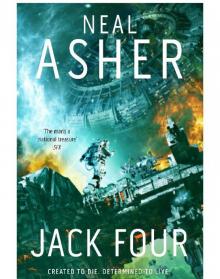 Jack Four
Jack Four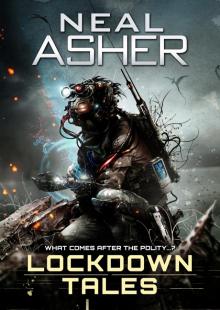 Lockdown Tales
Lockdown Tales The Warship
The Warship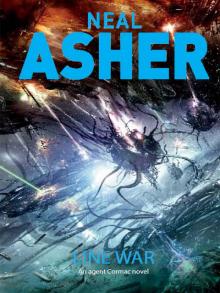 Line War
Line War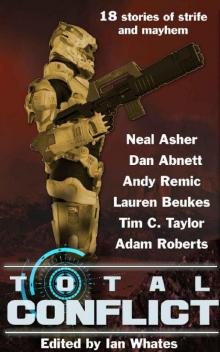 Total Conflict
Total Conflict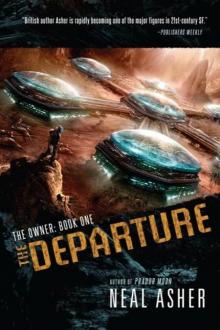 The Departure
The Departure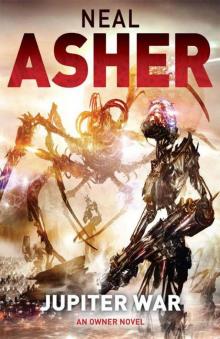 Owner 03 - Jupiter War
Owner 03 - Jupiter War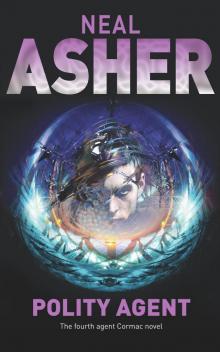 Polity Agent
Polity Agent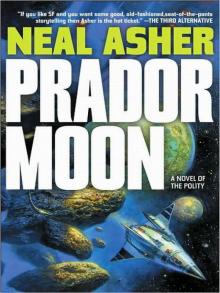 Prador Moon
Prador Moon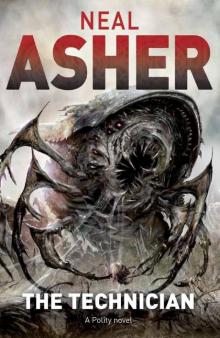 The Technician
The Technician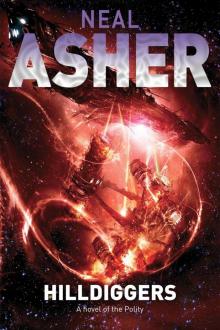 Hilldiggers
Hilldiggers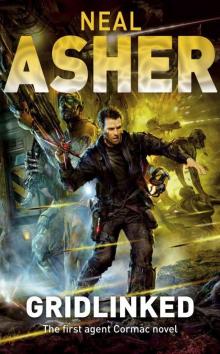 Gridlinked
Gridlinked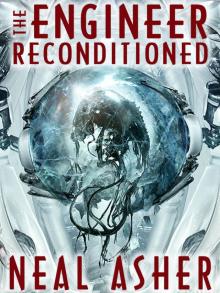 The Engineer ReConditioned
The Engineer ReConditioned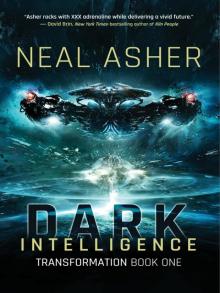 Dark Intelligence
Dark Intelligence The Soldier: Rise of the Jain, Book One
The Soldier: Rise of the Jain, Book One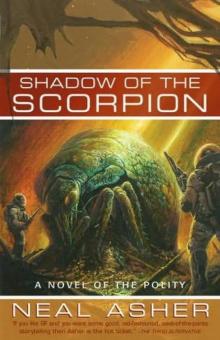 Shadow of the Scorpion p-2
Shadow of the Scorpion p-2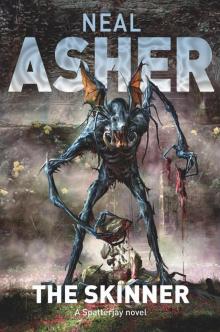 The Skinner
The Skinner The Soldier
The Soldier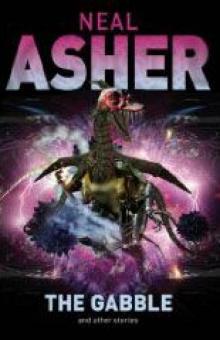 The Gabble p-13
The Gabble p-13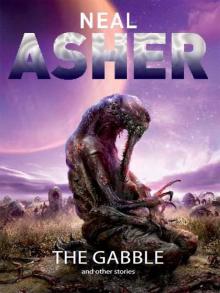 The Gabble and Other Stories
The Gabble and Other Stories The Parasite
The Parasite The Other Gun
The Other Gun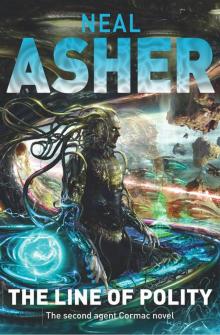 The Line of Polity
The Line of Polity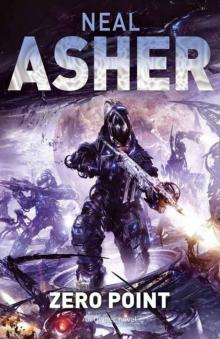 Zero Point (Owner Trilogy 2)
Zero Point (Owner Trilogy 2)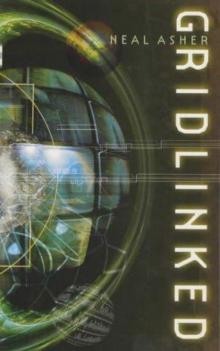 Gridlinked ac-1
Gridlinked ac-1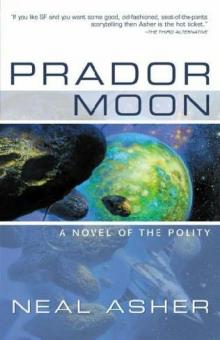 Prador Moon p-1
Prador Moon p-1 Infinity Engine
Infinity Engine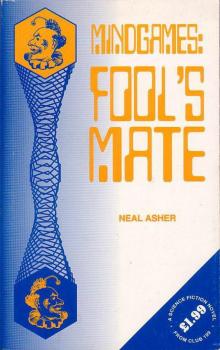 Mindgames: Fool's Mate
Mindgames: Fool's Mate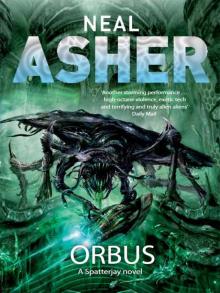 Orbus
Orbus Africa Zero
Africa Zero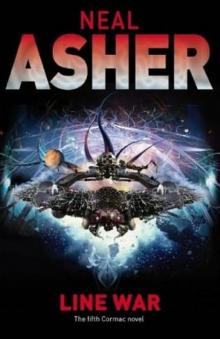 Line War ac-5
Line War ac-5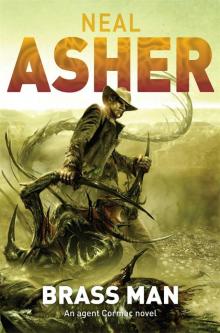 Brass Man
Brass Man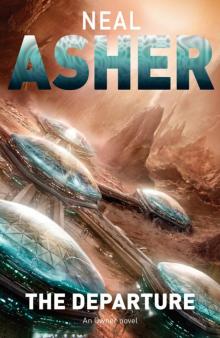 The Departure to-1
The Departure to-1 Cowl
Cowl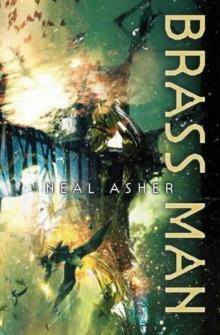 Brass Man ac-3
Brass Man ac-3 Hilldiggers (polity)
Hilldiggers (polity)![Greg Bear - [Eon Trilogy 1] - Eon (rescan) (v1.0) Read online](http://i1.bookreadfree.com/i2/04/08/greg_bear_-_eon_trilogy_1_-_eon_rescan_v1_0_preview.jpg) Greg Bear - [Eon Trilogy 1] - Eon (rescan) (v1.0)
Greg Bear - [Eon Trilogy 1] - Eon (rescan) (v1.0) The Skinner s-1
The Skinner s-1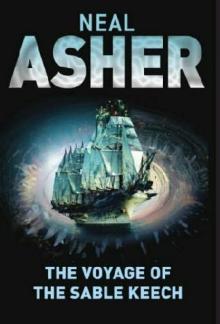 The Voyage of the Sable Keech s-2
The Voyage of the Sable Keech s-2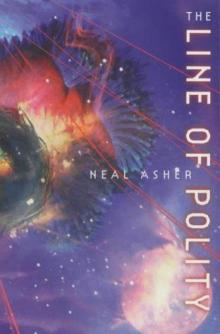 The Line of Polity ac-2
The Line of Polity ac-2 War Factory: Transformations Book Two
War Factory: Transformations Book Two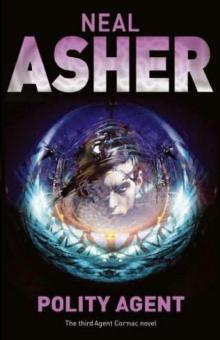 Polity Agent ac-4
Polity Agent ac-4